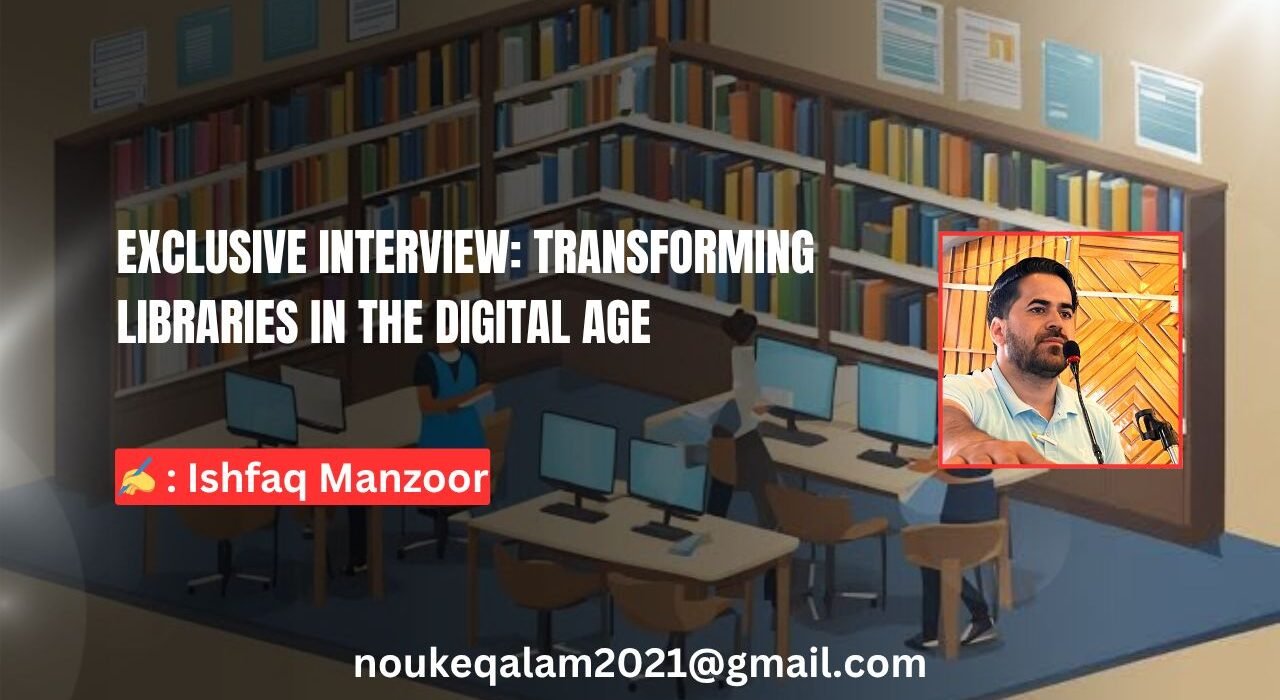✒️:. NQ News Service
Guest: Ishfaq Manzoor – Writer, LIS Professional, and Social Innovator from Kulgam
Q: Ishfaq, libraries are often called the “heart of educational institutions.” How do you see their role in today’s world?
Ans: Libraries remain the intellectual heartbeat of any academic and social setup. They are not just repositories of books but dynamic spaces that inspire learning, critical thinking, and creativity. Today, libraries act as knowledge gateways, blending print resources with e-books, digital journals, and AI-powered tools. Their role is more crucial than ever, especially in guiding students and researchers through the overwhelming sea of information.
Q: With the rise of digital platforms, some believe libraries are losing relevance. What is your take on this?
Ans: On the contrary, libraries are becoming even more relevant. Digital platforms may provide quick information, but libraries ensure authenticity, reliability, and depth. Beyond access to knowledge, libraries foster research skills, academic integrity, and community engagement. In fact, the digital revolution has enhanced their scope. Libraries now provide remote access, digital archives, and collaborative learning spaces.
Q: As an LIS professional, what challenges do libraries generally face today?
Ans: Libraries across the globe face challenges such as limited budgets, rapid technological changes, and the need for continuous upskilling of staff. The expectations of users are also evolving. They want instant, seamless, and remote access to resources. Meeting these demands while preserving the traditional culture of books is the balancing act for LIS professionals everywhere.
Q: You have introduced unique concepts like Zinda Kitab Ghar and Domestic Libraries. Can you tell us about them?
Ans: Yes. Zinda Kitab Ghar (Living Library) is my concept where people themselves become “living books” by sharing their knowledge, experiences, and stories directly with others. It’s about bringing wisdom to life through dialogue. Similarly, the idea of Domestic Libraries is to encourage families to create small reading spaces at home. This not only promotes the habit of reading but also strengthens family bonds and nurtures a culture of learning from childhood. Both concepts reflect my belief that libraries are not confined to buildings; they are living ideas that can exist anywhere.
Q: You have also published books and papers. Could you share a little about your work as a writer?
Ans: Writing has always been a natural extension of my professional and personal journey. I have authored several books on Library and Information Science (LIS), including A Comprehensive Book of LIS, Housekeeping Operations, and Library Cataloguing, which are widely used by students and professionals. I also write on social and motivational themes. My book Life: A Dream to Struggle for Zero reflects on perseverance, human values, and the importance of never giving up in life. Alongside books, I have published research papers and articles in the field of LIS, focusing on digital transformation, e-resources, and the evolving role of libraries in society. Through both my academic and creative writing, I aim to inspire learning and positive change.
Q: How can we revive the culture of reading in society?
Ans: The culture of reading needs collective revival. We must make reading joyful, visible, and accessible. Libraries can organize book exhibitions, author meets, reading clubs, and community-driven activities. Schools and families should encourage children to build home libraries, even with a few books. When people start seeing books not as burdens but as companions, the culture of reading naturally flourishes.
Q: What innovations do you think the libraries of the future must adopt?
Ans: Future libraries will be hybrid in nature, combining print with technology. They must integrate AI-driven discovery tools, e-resources, digital repositories, and remote access platforms like RemoteXs. At the same time, they must continue to provide quiet study spaces, guidance from LIS professionals, and human-centered services. A true library of the future will blend technology, tradition, and the human touch.
Q: You are also a writer and social innovator. How does this complement your work as an LIS professional?
Ans: Writing and LIS go hand in hand. Being surrounded by knowledge, research, and books naturally inspires reflection. My writings, whether in books, articles, or columns, allow me to share insights with a larger audience. Similarly, my social initiatives like Domestic Libraries and Zinda Kitab Ghar are extensions of my professional philosophy. They prove that LIS professionals are not just managers of books but torchbearers of knowledge, values, and social innovation.
Q: Finally, what is your message to young students and society at large about libraries?
Ans: My message is clear. Libraries are not optional; they are essential. Every great society has been built on knowledge, and libraries are its foundation. I urge students to use libraries as life-learning spaces, not just exam-prep centers. I also urge policymakers and communities to see libraries as an investment in the future of education, research, and humanity.
This inspiring conversation with Ishfaq Manzoor highlights not only his professional vision as an LIS expert but also his contributions as a writer and innovator, proving that libraries are living movements shaping knowledge, culture, and the future.



